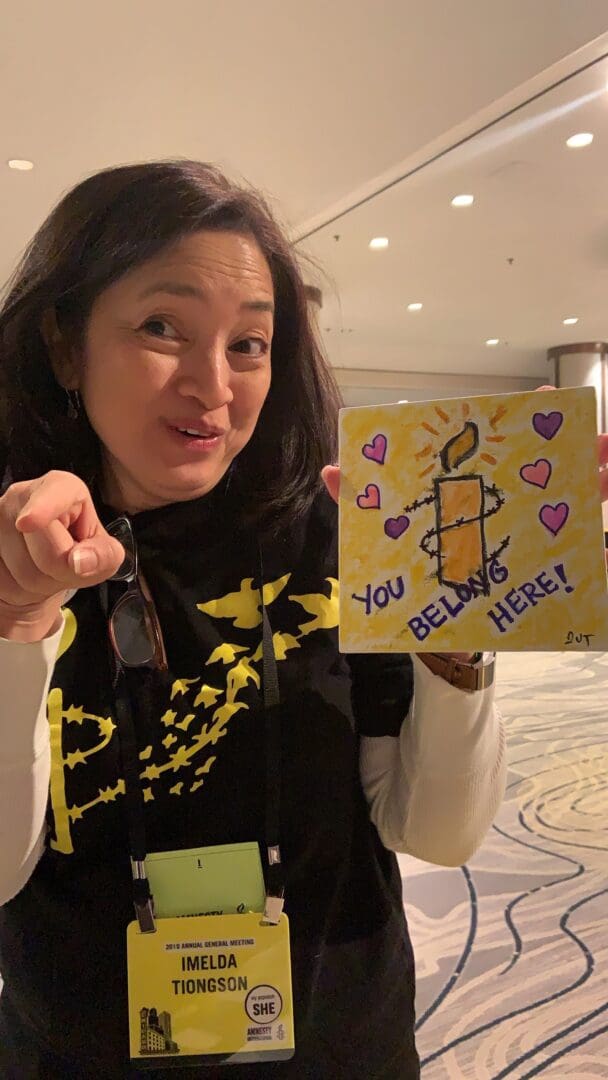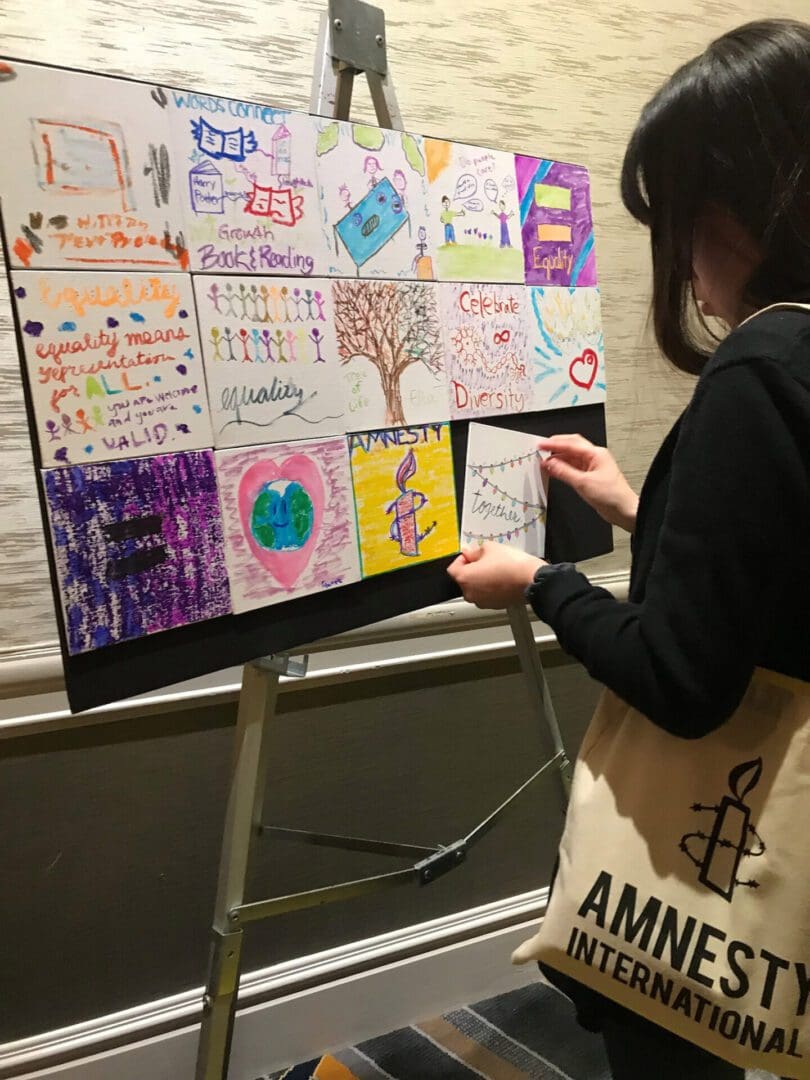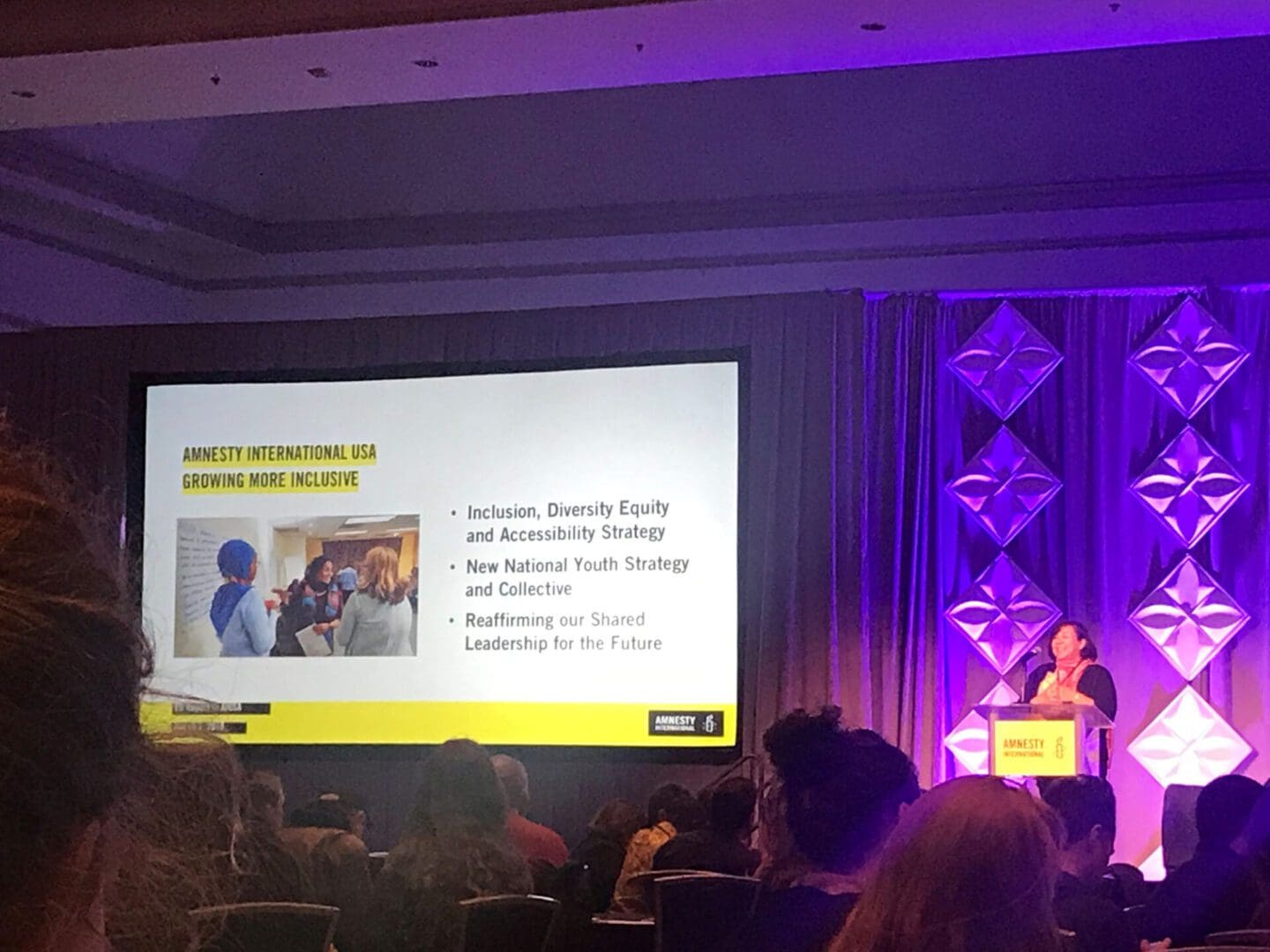Amnesty International is building a bigger, bolder and more inclusive movement
As an international, intercultural, intergenerational and intersectional movement of activists committed to protecting and advancing human rights for all, Amnesty is deeply committed to Inclusion, Diversity, Equity & Accessibility (IDEA).
It’s not only vital that we walk the talk, but IDEA is also an imperative for innovation, growth and impact. In other words, we simply cannot fulfill our mission without it. We recognize inclusion is always intentional and an ongoing journey that requires all of us. Our entire community of activists, including our members, staff and board of directors are partners in embracing diversity, fostering an inclusive culture and increasing equity and accessibility for all.
We invite you to join us as we embark on this journey together!
What does this concept entail?
 Inclusion: everyone belongs in our movement, feels like they can be their authentic selves, and is heard, seen, valued and fully involved in our community.
Inclusion: everyone belongs in our movement, feels like they can be their authentic selves, and is heard, seen, valued and fully involved in our community.
 Diversity: the full range of identity dimensions that make us uniquely and authentically human, including an appreciation for intersectionality, identity spectrums and non-binary identities.
Diversity: the full range of identity dimensions that make us uniquely and authentically human, including an appreciation for intersectionality, identity spectrums and non-binary identities.
 Equity: fairness that aims to increase inclusion by reducing inequalities resulting from structural discrimination based on identity dimensions and other contextual factors.
Equity: fairness that aims to increase inclusion by reducing inequalities resulting from structural discrimination based on identity dimensions and other contextual factors.
 Accessibility: dismantling barriers to full participation, including physical and virtual spaces, opportunities, culture, language, information and relationships.
Accessibility: dismantling barriers to full participation, including physical and virtual spaces, opportunities, culture, language, information and relationships.
What does it mean at Amnesty?
- We are examining our culture, including our values, behaviors, language, standards and expectations, and other patterns that shape our staff and members’ experiences, so that we can increase belonging, wellbeing, trust and connectedness.
- We embrace and celebrate the diversity of our staff and members, take intentional measures to increase diversity in all areas and levels so that our organization reflects our communities, grows inclusively, and can be sustainable for the future.
- We are increasing awareness, collecting data, and building systems, processes, policies and practices to address historical inequities, with the goal of transformation, equity and inclusion for all.
- We are identifying and reducing barriers to access, opportunity, participation, and information in areas such as talent management, facilities, events, subsidies, communications, education, etc.
Our Goals

Bigger Community
WHO WE WORK WITH
Increase diversity among our staff, board, members, donors, vendors and partners through inclusive and equitable practices, policies and processes.




Bolder Campaigns
THE WORK WE DO
Ensure our research, campaigns, programs, organizing, and public affairs, reflect and advance our IDEA values as integral to fulfilling our mission and growing our movement with integrity and maximum impact.




More Inclusive Culture
HOW WE WORK
Engage our staff, board, members and partners in fostering an inclusive, accessible, safe, connected, collaborative, inspiring, innovative and accountable culture for all.




OUR COMMITMENT TO ANTI-RACISM AND FIGHTING RACIAL INJUSTICE
A Note from Paul O’Brien and the AIUSA Executive Team
Dismantling white supremacy is central to the fight for human rights in the United States and around the world. It’s a proclamation that is easy to make but will require tenacious commitment and unwavering engagement to transform all our systems—economic, political, social, and cultural—towards becoming actively anti-racist. Amnesty International is the world’s largest grassroots human rights organization, with millions of members and supporters, and must help lead this change. The International Board of Amnesty shares this commitment to becoming an anti-racist organization, starting with honest reflections, listening and learning to inform anti-racist practices and organizational change efforts across Amnesty’s culture, operations, and human rights work. As we mobilize staff and activists and work with partners to help transform the multiple systems where oppression operates in the world around us as part of our human rights mandate, anti-racism must be integral to our work.
What does that mean for Amnesty International in the United States?
It means learning about and from each other. It means becoming deeply anti-racist in all our workplaces and in our activist spaces. It means using our people power to fight injustice and centering the voices and experiences of those most impacted by racist structures, beliefs, and laws. Fundamentally, it means doing our human rights work differently than it has been done before, because we know that who we work with, how we work, the work we do, and ultimately who we are, are all interconnected.
It also means acknowledging that we can and must do a better job of being anti-racist in our organization. That will require listening to the concerns of colleagues and activists who are people of color in particular. We recognize that our renewed commitment to becoming an inclusive and anti-racist movement will require that we are willing to take steps to ensure that the larger human rights movement does not perpetuate a culture of exclusion and discrimination. The AIUSA board and executive team pledge that we must and will do better.
Answering the calls for change from staff and activists, especially people of color, AIUSA began this work in earnest three years ago when we hired our first head of IDEA (Inclusion, Diversity, Equity and Accessibility), established a staff and activist IDEA council, and developed a framework and strategy to drive organizational change. Racial equity and anti-racism will remain central to these efforts.
To increase learning and engagement on IDEA across staff and activists, we have designed and delivered trainings, brown bag sessions, and resources, and will soon roll out specific education on anti-racism with the support of an external partner. To ensure equity across talent management processes, we have worked to improve our recruitment, onboarding, promotion, and professional development practices. We are also expanding demographic data collection and analysis, and will be conducting regular culture and engagement studies. To strengthen leadership engagement and ownership, the executive team regularly discusses IDEA and racial equity and incorporates these considerations into decision-making, and the board is actively engaged in these conversations as well. We are also working closely with managers on equity efforts and will be providing more targeted manager training and support later this year.
To improve accountability, in 2020 we developed a new Code of Conduct that provides clear expectations for our staff, members and board on anti-harassment, anti-discrimination and treating all individuals with dignity and respect. It also provides a process for filing grievances, investigating claims and accountability mechanisms. One of the most challenging issues is reducing and addressing biases and micro-behaviors more effectively, and we know we have a lot more work to do on this. We have begun incorporating IDEA principles into our impact evaluation and testing practices and are ensuring that anti-racism is a key priority in our new strategic plan to guide our culture change, movement building efforts, and human rights work itself. We are also collaborating with the International Secretariat and other Amnesty sections to drive change in our global movement. And most importantly, throughout all these efforts, we will actively listen to our colleagues and activists of color and increase allyship and solidarity across identities, so that we make progress together.
As an executive team, backed fully by our board of directors, we are committed to transforming ourselves, our organization, and our movement. We understand the skepticism with which our commitment to creating an anti-racist and more inclusive organization may be greeted. We know that it will take time to earn the trust of our staff, members and partners, which requires sincere, bold, and tangible action that drives sustainable change. IDEA and anti-racism work are mission critical and must be part of our core values as a human rights movement. We will work tirelessly to ingrain this value in all that we do and in all that we are.

